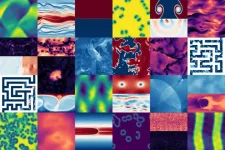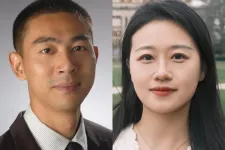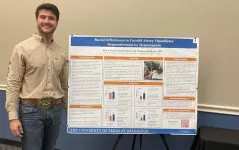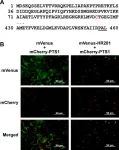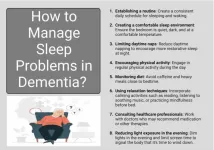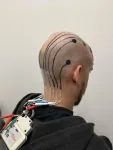(Press-News.org) With support from the University of Houston's Andy & Barbara Gessner College of Nursing, two universities in India - MGM Institute of Health Sciences in Mumbai and Krishna Institute of Medical Sciences - have introduced the Doctor of Nursing Practice degree, expanding advanced nursing education in the country. It is the first time any university in India has offered the degree.
The Gessner College graduated its first class of DNP professionals in May 2024.
The DNP doctorate degree prepares family nurse practitioners and nurse executives to address the shortages of primary care providers, nursing educators and leaders in a complex health care environment. The program raises the bar for preparation necessary for advanced nursing practice from the master’s degree to the doctorate level.
The idea is born, and work commences
The idea to launch the degree program in India came across the globe from member of the UH System Board of Regents, Durga D. Agrawal, president and CEO, Piping Technology & Products, Inc. In addition to bringing the DNP program to UH, Agrawal and his wife Sushila had the opportunity, in Feb. 2017, to meet with India’s Prime Minister Narendra Modi in his office in Delhi and convinced him of its ability to improve healthcare worldwide.
“We discussed ways the DNP program, could assist in addressing India's healthcare needs, particularly in rural areas,” said Agrawal. “I highlighted how bringing a program like the DNP from Texas could help upskill nurses in India, providing them with the clinical expertise required to address the health challenges faced in underserved regions.”
Later that year Kathryn Tart, Gessner College founding dean, professor and Humana Endowed Dean's Chair in Nursing and nursing professor, Shainy Varghese, professor of nursing, Fulbright specialist and global nurse consultant, traveled to India to lay the groundwork for the DNP program with the Indian Nursing Council and the two universities. The conversations continued with monthly online meetings that shaped the program even amid the pandemic.
“This was a critical moment in securing institutional support in India,” said Tart. “It takes time and so much effort to put this program in place, but the outcome – raising the bar for nursing education and helping fill the leadership shortage – makes all the effort worthwhile. We continue to press forward to help solve the nursing shortage.”
Forward progress to the present
Varghese was in India for the historic launch and festivities surrounding the DNP program inaugural ceremonies in October along with Beena Joseph, UH clinical assistant professor of nursing and coordinator of clinical learning.
“The program holds immense potential to revolutionize nursing education and critical care practice in India, and we are proud to have been a part of this significant milestone,” said Varghese.
In Texas today approximately 3,000 DNP professionals practice with approximately 5,000 more enrolled in one of many DNP programs across the state.
“Given the limited number of physicians and healthcare professionals, I believe that this program is having a significant impact in the healthcare industry to help alleviate these shortages in Texas,” said Agrawal. “Looking ahead, I envision this program continuing to grow and set a benchmark for Nursing education nationwide.”
And in India, too.
END
With UH assist, two universities in India launch Doctor of Nursing degree program
University of Houston guidance brings project to fruition
2024-12-02
ELSE PRESS RELEASES FROM THIS DATE:
New datasets will train AI models to think like scientists
2024-12-02
What can exploding stars teach us about how blood flows through an artery? Or swimming bacteria about how the ocean’s layers mix? A collaboration of researchers from universities, science philanthropies and national laboratories has reached an important milestone toward training artificial intelligence models to find and exploit transferable knowledge between seemingly disparate fields to drive scientific discovery.
This initiative, called Polymathic AI, uses technology similar to that powering large language models such as OpenAI’s ChatGPT ...
Brief scientific literacy interventions may quash new conspiracy theories
2024-12-02
UNIVERSITY PARK, Pa. — The more time you spend on social media, the likelier you are to have come across a viral post that seems too strange to be true. Brief scientific literacy interventions, especially those that focus on critical thinking skills, may help to undermine conspiracy beliefs and behaviors before the conspiracy theories have a chance to take root, according to a team led by Penn State researchers.
The team published their findings in the Journal of Consumer Research.
\“While some conspiracy beliefs may seem relatively harmless, others — about vaccines, genetically modified organisms and climate change, for example ...
Illinois researchers examine teens’ use of generative AI, safety concerns
2024-12-02
CHAMPAIGN, Ill. — Teenagers use generative artificial intelligence for many purposes, including emotional support and social interactions. A study by University of Illinois Urbana-Champaign researchers found that parents have little understanding of GAI, how their children use it and its potential risks, and that GAI platforms offer insufficient protection to ensure children’s safety.
The research paper by information sciences professor Yang Wang, the co-director of the Social Computing Systems Lab, and doctoral student Yaman Yu is one of the first published sources of data on the uses and risks of GAI for children. Wang ...
UTA student recognized for research on high-fat diets
2024-12-02
University of Texas at Arlington senior Ken Perry has always been interested in how the heart works. This curiosity led the Arlington High School graduate to start working in the lab of UTA kinesiology Professor R. Matthew Brothers during his second year of college. Now, two years later, Perry is the recipient of two research awards from the American Physiological Society (APS) for his research on a connection between high-fat meals and cardiovascular health.
“I always wanted to learn about heart and blood flow, so when friend of mine interested in research encouraged me to apply for the SURPINT program ...
Smallest walking robot makes microscale measurements
2024-12-02
ITHACA, N.Y. – Cornell University researchers have created the smallest walking robot yet. Its mission: to be tiny enough to interact with waves of visible light and still move independently, so that it can maneuver to specific locations – in a tissue sample, for instance – to take images and measure forces at the scale of some of the body’s smallest structures.
The team’s paper, “Magnetically Programmed Diffractive Robotics,” published in Science.
“A walking robot that’s small enough to interact with and shape light effectively takes a microscope’s lens and puts it directly ...
Peroxisomal protein boosts plant immunity to thrive under environmental stress
2024-12-02
Salicylic acid is vital for protecting plants from pathogens, but its synthesis remains unclear. A recent study by Shinshu University researchers has discovered that the protein HSR201 is key to its production. They found that HSR201 localizes to specific organelles called peroxisomes through a unique targeting signal. This discovery improves our understanding of how plants produce salicylic acid and could pave the way for developing engineered crops with improved disease resistance.
Plant hormones, or phytohormones, are vital for plant growth, adaptation, and defense. ...
Critical relationship between stem cells and mechanical signals unveiled
2024-12-02
A new study from The Hospital for Sick Children (SickKids) and Institut Curie reveals how stem cells sense and respond to their environment, with implications for inflammatory bowel disease and colorectal cancer.
Stem cells constantly adapt to their environment to maintain organ and tissue health, informed by chemical signals and physical forces. When they do not function as intended, stem cells can result in a number of health conditions including inflammatory bowel disease (IBD) and colorectal (bowel) cancer, where they continue to divide until a tumour forms.
Until ...
A cause of hyperinflammatory response in lethal COVID-19 identified
2024-12-02
As part of the COVID-19 International Research Team, researchers at the Johns Hopkins Kimmel Cancer Center, Children’s Hospital of Philadelphia, the University of Pittsburgh and Weill Cornell Medicine discovered a novel cause of cytokine storm — the extreme inflammatory response associated with increased risk of death in COVID-19 infection.
Their findings were reported Nov. 27 in the online issue of Proceedings of the National Academy of Sciences.
In an intensive genomic search for causes of cytokine storm, the research team used autopsy samples obtained from 40 patients who died from COVID-19. They performed genome analysis ...
Sleep deprivation in dementia: Heart disease, diabetes, anxiety, and thyroid disorders
2024-12-02
"Sleep disturbances are a significant concern in individuals with dementia, affecting their overall health and quality of life, as well as that of their family members and caregivers.”
BUFFALO, NY- December 2, 2024 – A new review was published on the cover of Aging (listed by MEDLINE/PubMed as "Aging (Albany NY)" and "Aging-US" by Web of Science) Volume 16, Issue 21, titled, “Sleep deprivation in dementia comorbidities: focus on cardiovascular disease, diabetes, anxiety/depression and thyroid disorders.”
The review, authored by Upasana Mukherjee, Ujala Sehar, Malcolm Brownell, and ...
Temporary tattoo printed directly on the scalp offers easy, hair-friendly solution for measuring brainwaves
2024-12-02
For the first time, scientists have invented a liquid ink that doctors can print onto a patient’s scalp to measure brain activity. The technology, presented December 2 in the Cell Press journal Cell Biomaterials, offers a promising alternative to the cumbersome process currently used for monitoring brainwaves and diagnosing neurological conditions. It also has the potential to enhance non-invasive brain-computer interface applications.
“Our innovations in sensor design, biocompatible ink, and high-speed printing pave the way for future on-body manufacturing of electronic tattoo sensors, with broad applications both within and beyond ...
LAST 30 PRESS RELEASES:
National Reactor Innovation Center opens Molten Salt Thermophysical Examination Capability at INL
International Progressive MS Alliance awards €6.9 million to three studies researching therapies to address common symptoms of progressive MS
Can your soil’s color predict its health?
Biochar nanomaterials could transform medicine, energy, and climate solutions
Turning waste into power: scientists convert discarded phone batteries and industrial lignin into high-performance sodium battery materials
PhD student maps mysterious upper atmosphere of Uranus for the first time
Idaho National Laboratory to accelerate nuclear energy deployment with NVIDIA AI through the Genesis Mission
Blood test could help guide treatment decisions in germ cell tumors
New ‘scimitar-crested’ Spinosaurus species discovered in the central Sahara
“Cyborg” pancreatic organoids can monitor the maturation of islet cells
Technique to extract concepts from AI models can help steer and monitor model outputs
Study clarifies the cancer genome in domestic cats
Crested Spinosaurus fossil was aquatic, but lived 1,000 kilometers from the Tethys Sea
MULTI-evolve: Rapid evolution of complex multi-mutant proteins
A new method to steer AI output uncovers vulnerabilities and potential improvements
Why some objects in space look like snowmen
Flickering glacial climate may have shaped early human evolution
First AHA/ACC acute pulmonary embolism guideline: prompt diagnosis and treatment are key
Could “cyborg” transplants replace pancreatic tissue damaged by diabetes?
Hearing a molecule’s solo performance
Justice after trauma? Race, red tape keep sexual assault victims from compensation
Columbia researchers awarded ARPA-H funding to speed diagnosis of lymphatic disorders
James R. Downing, MD, to step down as president and CEO of St. Jude Children’s Research Hospital in late 2026
A remote-controlled CAR-T for safer immunotherapy
UT College of Veterinary Medicine dean elected Fellow of the American Academy of Microbiology
AERA selects 34 exemplary scholars as 2026 Fellows
Similar kinases play distinct roles in the brain
New research takes first step toward advance warnings of space weather
Scientists unlock a massive new ‘color palette’ for biomedical research by synthesizing non-natural amino acids
Brain cells drive endurance gains after exercise
[Press-News.org] With UH assist, two universities in India launch Doctor of Nursing degree programUniversity of Houston guidance brings project to fruition

